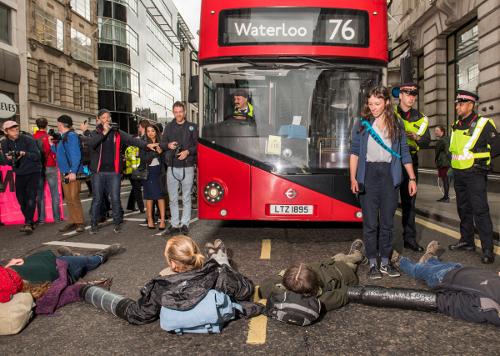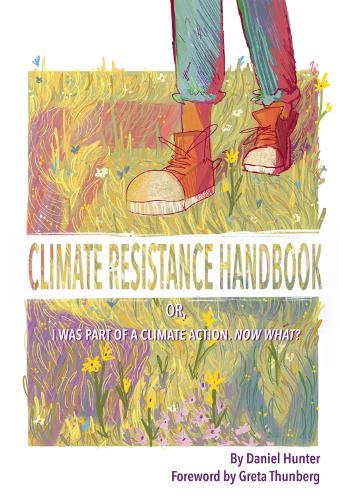
If one core part of XR’s approach has been to try and scare the bejesus out of people (see ‘XR: The dangers of apocalyptic organising’), a second has been its claim that it has a plan – indeed, one grounded in ‘social scientific research’ – that could save the day.
This has two parts: (a) a set of three demands; and (b) a strategy for winning these. Let's take these in turn.
Here in the UK the demands are:
(1) Tell the Truth: 'Government must tell the truth by declaring a climate and ecological emergency, working with other institutions to communicate the urgency for change.'
To date, both the UK parliament and over 100 local councils have made declarations that there is a ‘climate emergency’.
However, so far, business appears to be continuing as usual. As Mike Berners-Lee, an expert on carbon footprints, noted on Twitter: ‘when anyone uses the word emergency we all need to make sure action is commensurate with that. Otherwise we simply loose [lose] a word from the English language.’ [1]
(2) Act Now: 'Government must act now to halt biodiversity loss and reduce greenhouse gas emissions to net zero by 2025.'
This is perhaps the clearest of XR’s three demands – and also the most clearly utopian.
As it stands it would require annual cuts in greenhouse gas (GHG) emissions of roughly 50 percent for the next seven years. [2]
“When anyone uses the word ‘emergency’ we all need to make sure action is commensurate with that”
To get some handle on what this means, consider that the UK’s territorial GHG emissions fell by only 43 percent between 1990 and 2017, a period of 27 years, and fell by only 3 percent in 2017.[3]
Little wonder, perhaps, that even some XR members told New Scientist that it was ‘naive to suggest that the 2025 goal could be achieved.’ [4]
(3) Beyond Politics: 'Government must create and be led by the decisions of a [National] Citizens’ Assembly [NCA] on climate and ecological justice.'
Clearly this is potentially in tension with the other demands: ‘[W]hat if such forums reveal that many people are actually quite conservative about action on climate change as some studies suggest?’ asked New Scientist. [5]
At least as envisioned by Hallam, the NCA is supposed ‘to take over the sovereign role from a corrupted parliament’ (emphasis added), ‘deal[ing] with social and political legislation, [and] enacting emergency measures on the climate crisis’ as well as ‘creat[ing] a new written constitution which we would expect would make sure that such assemblies were a permanent fixture of our political life.’ [6]
In reality, small victories and stepping-stone goals are often necessary
This, he acknowledges, would be ‘as big a political shift as the transition from aristocratic rule to representational democracy’. [7] However, this is said to be necessary since ‘there is simply no chance of getting the rapid changes which are needed through negotiations which leave the present political class in power’.
In Hallam's view, ‘the probability of organising a political revolution to remove the corrupt political class has a higher chance… than the chance that the political class will respond to the climate crisis’.
Pause for a moment and ask yourself if this fantasy bears any relation to the political realities of the UK in 2019.
Only 2,000,000
So much for the demands. How does XR intend to win them?
XR co-founders Gail Bradbrook and Roger Hallam have both touched on this topic, giving varying levels of detail.
The Bradbrook version of the plan is outlined in the second half of the XR's ‘Heading for Extinction’ video. [8] The plan, she explains, is to engage in ‘ongoing civil disobedience leading to short jail time for some… to move the Overton window’. The Overton window is ‘what's seen as normal and acceptable [as] part of the mainstream of public discussion of issues’.
‘Periods of action’ will then be repeated ‘as needed’, with ‘organising in between.’ ‘[B]eyond that you only need between one percent and three percent of a population to be mobilised to bring about massive social change or the fall of a regime. This is data from Erica Chenoweth – it's only [sic] two million people in the UK’ (see 'XR: The 3.5 per cent rule' for more on where the magic numbers come from).
And that’s about it details-wise.
I’m reminded of a cartoon by Sidney Harris of two mathematicians surveying a complex calculation on a blackboard, the second step of which reads: ‘Then a miracle occurs’. ‘I think you should be more explicit in step two’, one says to the other. [9]
‘The main process’
Roger Hallam’s booklet, Common Sense for the 21st Century: Only Nonviolent Rebellion Can Now Stop Climate Breakdown and Social Collapse (15 April 2019), is much clearer about how he sees the rebellion winning XR’s demands.
‘There are a number of tactical options’, he writes, but ‘the main process’ involves mobilising thousands of people, amassing them in ‘a capital city where the elites in business, government, and the media are located’ and getting the activists to break the law in a nonviolent fashion, for example by ‘blocking the roads and transport systems’. [10]
“XR’s end-of-the-world-ism appears to be blocking clear strategic thinking”
These actions are then continued ‘day after day’ to ‘impose the necessary economic cost to bring the authorities to the table’, making sure that ‘the actions are celebratory and even fun.’‘After one or two weeks following this plan,’ Hallam assures us, ‘the historical records show that a regime is highly likely to collapse or is forced to enact structural change’ (emphasis added).
Needless to say, despite 11 days of remarkable and often inspiring protests this April, the UK government did not collapse. Nor was it ‘forced to enact structural change’.
Stepping stones
So what now? According to Hallam: ‘It is no longer possible to save our society through small incremental steps. Mass political disruption is now required.’ [11]
Yet in reality, small victories and stepping-stone goals are often necessary: to build skills and strength, to heighten morale, and to sustain a movement until it is capable of winning its bigger goals. This needn’t (and shouldn’t!) involve ditching one’s long-term revolutionary aspirations. But it does involve a recognition that this is going to be a marathon rather than a sprint.
This is where XR’s end-of-the-world-ism appears to be blocking clear strategic thinking. There’s no time for intermediate goals or demands because we have to win everything almost immediately. And we have to do this because the world may be about to end.
Is there a better approach out there? I think so.
[1] https://twitter.com/MikeBernersLee/status/1123942312789385221
[2] That is emissions cuts of 50% every year for seven years would reduce current emission levels to less than 1% of their current levels.
[3] Committee on Climate Change, ‘Reducing UK emissions – 2018 Progress Report to Parliament’ (hereafter CCC), 28 June 2018, https://www.theccc.org.uk/wp-content/uploads/2018/06/CCC-2018-Progress-Report-to-Parliament.pdf, p.14. Note that ‘territorial emissions’ do not take into account aviation and shipping or ‘outsourced’ emissions from imports (Rachel Schraer, ‘Climate change: Is Greta Thunberg right about UK carbon emissions?’, BBC Reality Check, 26 April 2019, https://www.bbc.co.uk/news/science-environment-48025650?utm_content=buffera3c01&utm_medium=social&utm_source=twitter.com&utm_campaign=buffer). In their report, the Committee on Climate Change note that 75% of territorial emissions reductions between 1990 and 2017 were in the power sector and ‘that reducing emissions from electricity generation is one of the simpler challenges for policy.’ By contrast, ‘Other sectors present harder challenges for emissions reduction, with fewer aggregated sectors to aim at and the requirement for policy to drive real changes in consumer behaviour.’ (CCC, pp. 11, 15). For an interesting analysis of the UK’s ‘consumption based emissions’ see Anne Owen, The UK’s carbon footprint is at its lowest level for 20 years, 11 April 2019, https://www.carbonbrief.org/guest-post-the-uks-carbon-footprint-is-at-its-lowest-level-for-20-years and Anne Owen, ‘Why the UK’s carbon footprint is decreasing’, 8 May 2019, https://www.carbonbrief.org/guest-post-why-uks-carbon-footprint-is-decreasing.
[4] Adam Vaughan, ‘The science behind Extinction Rebellion’s three climate change demands’, New Scientist, 25 April 2019, https://www.newscientist.com/article/2200755-the-science-behind-extinction-rebellions-three-climate-change-demands/. According to this article, climate scientist Mark Maslin ‘thinks acheiving net zero emissions in six years’ time instead is unrealistic’: ‘“2025 is too close as many of the changes require changes to infrastructure, ownership and of course replanting trees and rewilding, all of which take decades,” he says.’
[5] Ibid.
[6] Common Sense, pp. 7, 54
[7] Ibid, p.57
[8] Extinction Rebellion, ‘Heading for extinction and what to do about it’, 18 September 2018, https://www.youtube.com/watch?v=b2VkC4SnwY0
[9] http://www.sciencecartoonsplus.com/pages/gallery.php
[10] Common Sense, p.5
[11] Ibid, p.15. Hallam points to the fact that annual CO2 emissions have dramatically increased since 1990 to indict the ‘NGOs, political parties and movements that have ‘brought us through thirty years of abject failure’, claiming that these three ‘are now the biggest block to transformation’ (ibid, p.4). It is, of course, true that CO2 emissions have risen dramatically since 1990, and this should be at the forefront of the minds of all climate change activists, politicians and members of the public. However, it does not follow that pre-XR climate change activism has all been a waste of time from which activists today have nothing positive to learn. For example, here in the UK it was campaigning (led by Friends of the Earth) that won the historic Climate Change Act, creating legally-binding targets for the UK Government on future Green House Gas (GHG) emissions (specifically, the target was for net emissions to be cut to 80% of 1990 levels by 2050). To be sure, the Act was deeply flawed – and is certainly no longer fit for purpose in the light of scientific developments over the last ten years – but it nonetheless provides both a precedent and a basis for future campaigning and legislation. We’re not starting from nothing. Likewise, it was UK campaigners that forced the coalition government to cancel its plans for a third runway at Heathrow (now risen from the grave, still being resisted) and helped to prevent the building of a new generation of coal-fired power stations here. And the past decade of climate change campaigning has also been laying important ground work for the future. Indeed, according to Nick Engelfried while the concept of a Green New Deal ‘was first used in 2007 and soon became part of Barack Obama’s 2008 campaign platform’ the Obama administration ‘never seriously attempted the type of sweeping policies today’s Green New Deal advocates are demanding’ - in part because there insufficient grassroots support (Nick Engelfried, ‘US climate breakthrough’, Peace News, April – May 2019, http://peacenews.info/node/9332/us-climate-breakthrough). However, today, he notes ‘that may have changed. From mass protests that stopped pipelines and closed coal plants to grassroots organisations advancing clean energy at the local level to a nationwide divestment campaign that galvanised students around energy justice – the climate movement has grown a lot in the last decade.’ Indeed many founders of the Sunrise Movement – the youth-led movement that has been pushing Democrats to support a Green New Deal - ‘got their start organising in one or another of the waves of climate activism [including the fossil fuel divestment movement] that helped set the stage for [today’s] powerful Green New Deal movement.’ This sounds less like ‘abject failure’ than stepping stones to growing the bigger and more powerful movements that we’re going to need for the future.



